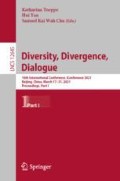Abstract
This pilot ethnographic study examines the feasibility of learning English with a gamified English e-learning platform among Primary Four (P4) and Primary Five (P5) students in a remote primary school in Henan, China. Forty-one students participated in a summer reading camp where the gamified platform in question was used. Results show that following 4 weeks of playing on the gamified platform, the majority of students developed substantial interest in reading more English books upon the fulfillment of their innate psychological needs for competence, relatedness and autonomy. The authors conclude that under a self-determination framework, the gamified platform has been effective in helping Chinese students in a rural community to learn English.
Access this chapter
Tax calculation will be finalised at checkout
Purchases are for personal use only
References
Bianco, J., Orton, J., Gao, Y. (eds.): China and English: Globalisation and the Dilemmas of Identity. Multilingual Matters, Bristol, UK (2009)
Deci, E., Ryan, R.: A motivational approach to self: integration in personality. In: Dienstbier, R. (ed.) Nebraska Symposium on Motivation, Perspectives on Motivation, vol. 38, pp. 237–288. University of Nebraska Press, Lincoln (1991)
Deterding, S., Dixon, D., Khaled, R., Nacke, L: From game design elements to gamefulness: defining gamification. In: Proceedings of the 15th International Academic MindTrek Conference: Envisioning Future Media Environments 2011, pp. 9–15. ACM, Tampere, Finland (2011)
Gui, M., He, Y., Shang, Y., Yu, Y.: Rural area primary school english teachers’ perception of the english course standards for compulsory education农村小学英语教师对《课标》的认识. Basic Foreign Lang. Educ. 21(2), 39–46 (2019)
Hong, Y.: China launches national cloud learning platform as teaching goes online amid epidemic. China Global Television Network, 21 February 2020. https://news.cgtn.com/news/2020-02-19/China-launches-national-cloud-learning-platform-for-online-education-Ods9XruOR2/index.html
Internet Network and Information Center: In: 45th Statistical Report on Internet Development, p. 17, April 2020. https://cnnic.com.cn/IDR/ReportDownloads/202008/P020200827549953874912.pdf
Krashen, S.D.: Free Voluntary Reading. Libraries Unlimited, Santa Barbara, CA (2011)
Ministry of Education, The People’s Republic of China: Standard English Curriculum in Compulsory Education, 2011 (edn.) 义务教育英语课程标准(2011年版). Beijing Normal University Press, Beijing (2011)
Palmer, S.: Toxic Childhood: How the Modern World Is Damaging Our Children and What We Can Do About It. Orion, London, UK (2006)
Plowman, L., Stephen, C., McPake, J.: Growing Up With Technology: Young Children Learning in a Digital World. Routledge, New York, NY (2010)
Qi, G.Y.: The importance of English in primary school education in China: perceptions of students. Multiling. Educ. 6(1), 1–18 (2016)
The 13th Five-Year Plan for Economic and Social Development of the People’s Republic of China 2016-2020. Central Compilation & Translation Press, Beijing (n.d.)
Zhao, Y.: World Class Learners: Educating Creative and Entrepreneurial Students. Corwin Press, Thousand Oaks, CA (2012)
Zhou, W.: Children make early start at learning English. China Daily, 24 January 2019. https://www.chinadaily.com.cn/a/201901/24/WS5c48f51da3106c65c34e629f.html
Acknowledgement
Our thanks go to SPDP who had welcomed us into Henan for this study.
Author information
Authors and Affiliations
Corresponding author
Editor information
Editors and Affiliations
Rights and permissions
Copyright information
© 2021 Springer Nature Switzerland AG
About this paper
Cite this paper
Meng, N., Lee, S.Y.C., Chu, S.K.W. (2021). A Pilot Ethnographic Study of Gamified English Learning Among Primary Four and Five Students in a Rural Chinese Primary School. In: Toeppe, K., Yan, H., Chu, S.K.W. (eds) Diversity, Divergence, Dialogue. iConference 2021. Lecture Notes in Computer Science(), vol 12645. Springer, Cham. https://doi.org/10.1007/978-3-030-71292-1_45
Download citation
DOI: https://doi.org/10.1007/978-3-030-71292-1_45
Published:
Publisher Name: Springer, Cham
Print ISBN: 978-3-030-71291-4
Online ISBN: 978-3-030-71292-1
eBook Packages: Computer ScienceComputer Science (R0)

